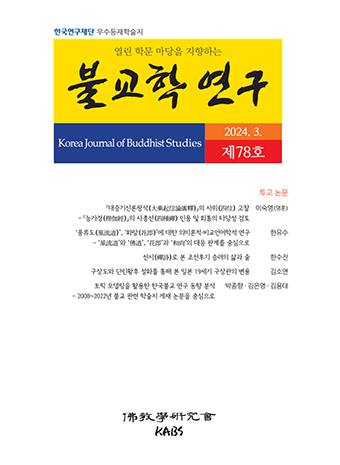Abstract
References
Sorry, not available.
Click the PDF button.
Information
Nāgārjuna(A.D.150-250) used mostly the system and terminologies of the meditation(dhyāna, 禪定) which were formed in the Hĩnayāna Buddhism, but its concept merely was characterized differently by the dhyāna of Mahāyāna Buddhism. As defined by the Buddhist Saint Nāgārjuna, the dhyāna-pāramitā is in principle interpreted in four stages of meditations(catvāri-dhyānāni, 四禪), but dhyāna-pāramitā(禪定波羅蜜多) does not mean the only catvāri- dhyānāni. Because the concept combined by all dhyāna is dhyāna- pāramitā. In the stage of catvāri-dhyānāni, a mind of carnal desires is removed by samatha(止, 'a single-pointed mediation') and simultaneously observing accurately the mind is operated through the wisdom(prajñā, 般若). Therefore, if any one defines the meaning of dhyāna-pāramitā as limitedly just only a process stage of practice which the mind of restless carnal desires is removed through the samatha(止), such a prejudiced point of view will have to be rectified since a genuine perception of the meaning about the dhyāna-pāramitā is not caught up.Therefore, dhyāna-pāramitā is not an ascetic exercise or not a process in which the dhyāna is realized, but its means a status in which the dhyāna has been realized entirely by the prajñā-pāramitā(般若波羅密多). And also dhyāna-pāramitā is an ascetic exercise in which has been realized in the organic relationship and the help along with the other means of transcendence like dāna-pāramitā(布施波羅蜜多, alms), śila-pāramitā(持戒波羅蜜多, discipline), kṣānti-pāramitā(忍辱波羅蜜多, forbearance), vĩrya-pāramitā(精進波羅蜜多, exertion) by perceiving the mind with prajñā-pāramitā.Nāgārjuna accepted the way of practice formally, but is looking essentially for the other points apart from this. In consequence, the status in which the dhyāna and the prajñā have been in perfect harmony realized by the Middle Way(中道, madhyamā) is called as the dhyāna-pāramitā. On the other hand, the status in which the dhyāna and the prajñā(wisdom) are not in perfect harmony is called as just the dhyāna. After all, his view of dhyāna is characterized to give priority on the revelation of prajñā(wisdom) rather than removal of carnal desires.
Click the PDF button.
- Publisher :Korean Association of Buddhist Studies
- Publisher(Ko) :불교학연구회
- Journal Title :Korea Journal of Buddhist Studies
- Journal Title(Ko) :불교학연구
- Volume : 5
- No :0
- Pages :279~307


 Korea Journal of Buddhist Studies
Korea Journal of Buddhist Studies






